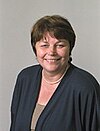The shadow cabinet or shadow ministry is a feature of the Westminster system of government. It consists of a senior group of opposition spokespeople who, under the leadership of the Leader of the Opposition, form an alternative cabinet to that of the government, and whose members shadow or mirror the positions of each individual member of the Cabinet. Their areas of responsibility, in parallel with the ruling party's ministries, may be referred to as a shadow portfolio. Members of a shadow cabinet have no executive power. It is the shadow cabinet's responsibility to scrutinise the policies and actions of the government, as well as to offer alternative policies. The shadow cabinet makes up the majority of the Official Opposition frontbench, as part of frontbenchers to the parliament. Smaller opposition parties in Britain and Ireland have Frontbench Teams.
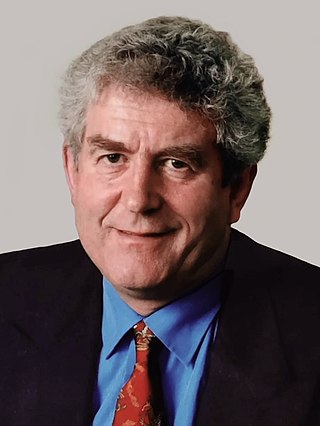
Hywel Rhodri Morgan was a Welsh Labour politician who was the First Minister of Wales and the Leader of Welsh Labour from 2000 to 2009. He was also the Assembly Member for Cardiff West from 1999 to 2011 and the Member of Parliament for Cardiff West from 1987 to 2001. He remains the longest-serving First Minister of Wales, having served in the position for 9 years and 304 days. He was Chancellor of Swansea University from 2011 until his death in 2017.
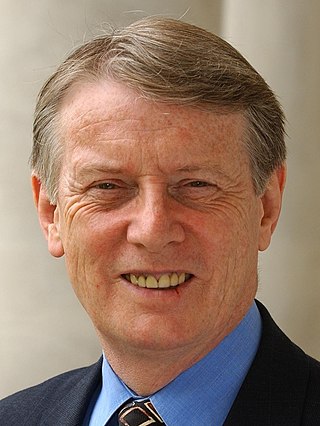
Alun Edward Michael is a Welsh Labour and Co-operative politician. He served as Secretary of State for Wales from 1998 to 1999 and then as the first First Secretary of Wales and Leader of Welsh Labour from 1999 to 2000. He went on to serve as South Wales Police and Crime Commissioner from 2012 to 2024.
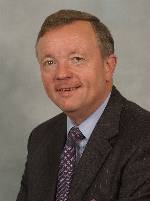
Peter John Law was a Welsh politician. For most of his career Law sat as a Labour councillor and subsequently Labour Co-operative Assembly member (AM) for Blaenau Gwent. Latterly he sat as an independent member of Parliament (MP) and AM for the same constituency.

Michael James German, Baron German is a Welsh politician who was Deputy First Minister of Wales from 2000 to 2001 and 2002 to 2003 and Leader of the Welsh Liberal Democrats from 1998 to 2008, first as its de facto leader until 2007 and then as its official leader from 2007. He was also Minister for Economic Development from 2000 to 2001 and Minister for Rural Affairs and Wales Abroad from 2002 to 2003. German was elected to the National Assembly for Wales in 1999 where he was Assembly Member (AM) for South Wales East until 2010 and led his party group until 2008. In 2010, he was granted a life peerage and joined the House of Lords as a working peer for the Liberal Democrats. He was the first-ever deputy first minister of Wales.
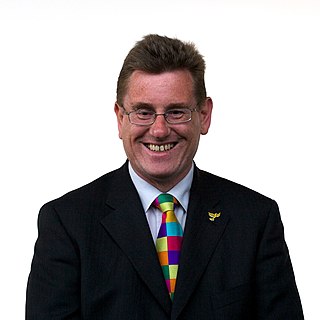
Peter Malcolm Black is a Welsh Liberal Democrat politician, and was a Member of the Welsh Assembly for the South Wales West Region between 1999 and 2016.
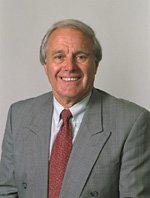
Thomas Middlehurst is a British retired politician who served as Leader of Flintshire County Council from 1996 to 1999 and Assembly Secretary for Education and Training in the National Assembly for Wales from 1999 to 2000. A member of the Labour Party, he was Assembly Member (AM) for Alyn and Deeside from 1999 until his retirement in 2003.
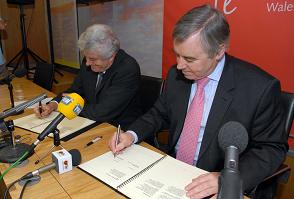
One Wales was the coalition agreement for the National Assembly for Wales between Labour and Plaid Cymru agreed to by Rhodri Morgan, First Minister of Wales and leader of Welsh Labour, and Ieuan Wyn Jones, leader of Plaid Cymru, on 27 June 2007. It was negotiated in the wake of the preceding National Assembly election which resulted in a large Labour plurality, but no majority. Labour and Plaid Cymru approved the document in separate votes on 6 and 7 July, respectively.

Unlike in the Parliament at Westminster where there is an Official Opposition to the government of the day, all parties in the Scottish Parliament that are not in government are all technically on the same footing as 'opposition parties'. With the Scottish National Party (SNP) currently in government, the Scottish Conservatives and Scottish Labour each have a Shadow Cabinet composed of Members of the Scottish Parliament (MSPs) and prospective parliamentary candidates.

The 2007 National Assembly for Wales election was held on Thursday 3 May 2007 to elect members to the National Assembly for Wales. It was the third general election. On the same day local elections in England and Scotland, as well as the Scottish Parliament election took place. This election was preceded by the previous Assembly election in 2003.

The first Morgan government was formed on 16 October 2000 by Rhodri Morgan and a was a coalition government with the Liberal Democrats, it was officially referred to as the 'Coalition Partnership'. It was preceded by the Interim Morgan administration, a Labour minority administration headed by Rhodri Morgan between February and October 2000.

The Interim Morgan administration of Wales was formed on 9 February 2000 by Rhodri Morgan following the resignation of Alun Michael as First Secretary, which was pre-empted by a vote of no-confidence by Plaid Cymru.

In the Senedd, the Leader of the Opposition is the leader of the Official Opposition, the largest political party that is not in the Welsh Government. The Leader of the Opposition leads and appoints members of the Shadow Cabinet and as such is sometimes styled as the Shadow First Minister of Wales.

Dafydd Wigley became Leader of the Opposition and Shadow First Secretary of Wales after the creation of the National Assembly for Wales on 12 May 1999, following the first assembly election held on 6 May. Members of his shadow cabinet were elected by Plaid Cymru's assembly members and announced on 18 May.

Ieuan Wyn Jones became Leader of the Opposition in Wales after being elected as President of Plaid Cymru, the Official Opposition in the National Assembly for Wales, on 3 August 2000. Jones had previously served in these roles in an acting capacity on the behalf of his predecessor Dafydd Wigley from December 1999 to February 2000. He formed his shadow cabinet on 9 August and, like his predecessor, appointed himself Shadow First Secretary of Wales and Shadow Assembly Secretary for Finance. Members of his shadow cabinet were initially known as shadow assembly secretaries until October 2000. From that month, members were known as shadow ministers, with Jones's titles also changing to Shadow First Minister of Wales and Shadow Minister for Finance, after a similar change was made to the names of ministerial posts in Rhodri Morgan's coalition government between Labour and the Liberal Democrats. Jones's shadow cabinet was dissolved after the formation of a coalition government between Plaid Cymru and Morgan's Labour Party on 19 July 2007.

Rod Richards, the leader of the Welsh Conservative Group in the National Assembly for Wales, formed his frontbench team of party spokespeople on 13 May 1998. Richards had led his party into the 1999 National Assembly for Wales election after being elected as leader of the Welsh Conservative Group in 1998.

Mike German, the leader of the Welsh Liberal Democrat Group in the National Assembly for Wales, formed his second frontbench team of party spokespeople on 8 May 2003 after the dissolution of his party's coalition government with Rhodri Morgan's Welsh Labour following the 2003 National Assembly for Wales election. Richards had already formed a frontbench team before entering coalition, when his party became an opposition party after the 1999 National Assembly for Wales election before forming the coalition with Labour in October 2000.

Kirsty Williams, the leader of the Welsh Liberal Democrats, formed her frontbench team of party spokespeople in the National Assembly for Wales on 11 December 2008 after she was elected to succeed Mike German as party leader on 8 December. She reshuffled her frontbench team after the 2011 National Assembly for Wales election before her party's seat share was reduced from five to one at the 2016 National Assembly for Wales election, with Williams becoming the party's sole assembly member (AM).

Nick Bourne, the leader of the Welsh Conservative Group in the National Assembly for Wales, formed his frontbench team of party spokespeople between 18 August and 25 August 1999 after he was elected unopposed to succeed Rod Richards as group leader on 18 August, having already served as acting leader since 11 August. He made a minor reshuffle to his frontbench team in 2000 and made further changes to the team after the 2003 and 2007 National Assembly elections. Bourne's party became the official opposition after the 2007 Welsh government formation in July 2007, with Bourne leading a shadow cabinet as the leader of the opposition.

Ieuan Wyn Jones, the leader of Plaid Cymru, formed his frontbench team of party spokespeople in the National Assembly for Wales on 25 May 2011 after the dissolution of his party's coalition government with Rhodri Morgan and Carwyn Jones' Welsh Labour following the 2011 National Assembly for Wales election. Jones had previously led a shadow cabinet before entering coalition from 2000 to 2007, when his party had served as the Official Opposition since the 1999 National Assembly for Wales election.


